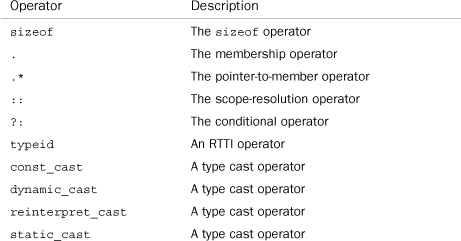Overloading Restrictions
Most C++ operators (see Table 11.1) can be overloaded in the manner described in the preceding section. Overloaded operators (with some exceptions) don’t necessarily have to be member functions. However, at least one of the operands has to be a user-defined type. Let’s take a closer look at the limits C++ imposes on user-defined operator overloading:
• The overloaded operator must have at least one operand that is a user-defined type. This prevents you from overloading operators for the standard types. Thus, you can’t redefine the minus operator (-) so that it yields the sum of two double values instead of their difference. This restriction preserves program sanity, although it may hinder creative accounting.
• You can’t use an operator in a manner that violates the syntax rules for the original operator. For example, you can’t overload the modulus operator (%) so that it can be used with a single operand:
int x;
Time shiva;
% x; // invalid for modulus operator
% shiva; // invalid for overloaded operator
Similarly, you can’t alter operator precedence. So if you overload the addition operator to let you add two classes, the new operator has the same precedence as ordinary addition.
• You can’t create new operator symbols. For example, you can’t define an operator**() function to denote exponentiation.
• You cannot overload the following operators:

This still leaves all the operators in Table 11.1 available for overloading.
• Most of the operators in Table 11.1 can be overloaded by using either member or nonmember functions. However, you can use only member functions to overload the following operators:

Table 11.1. Operators That Can Be Overloaded

This chapter does not cover every operator mentioned in the list of restrictions or in Table 11.1. However, Appendix E, “Other Operators,” summarizes the operators that are not covered in the main body of this text.
In addition to these formal restrictions, you should use sensible restraint in overloading operators. For example, you shouldn’t overload the * operator so that it swaps the data members of two Time objects. Nothing in the notation would suggest what the operator did, so it would be better to define a class method with an explanatory name such as Swap().
